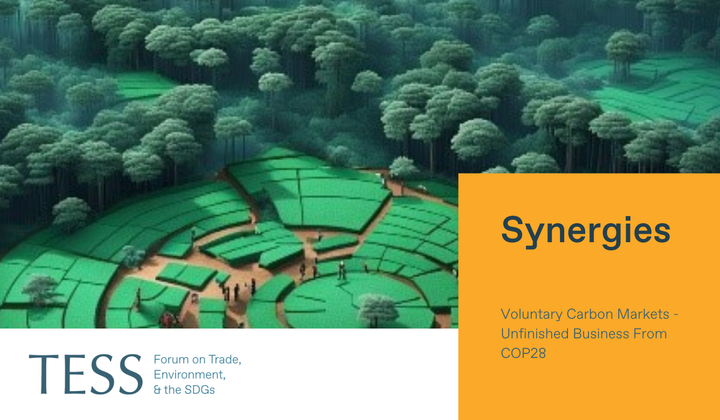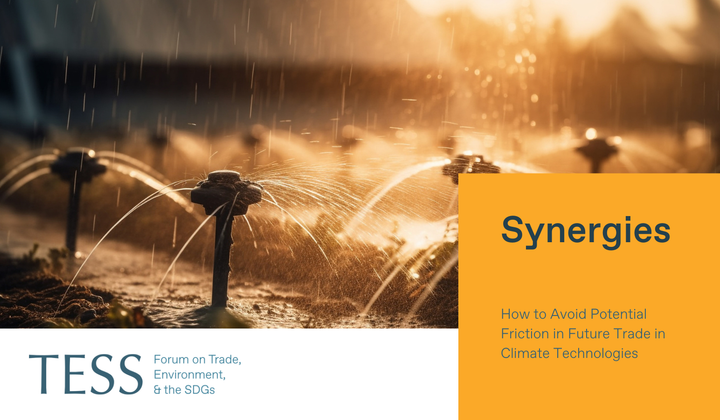On 26 June, in the opening plenary session of the Global Review of Aid for Trade 2024 at the World Trade Organization, Geneva, global leaders reflected on 18 years of the Aid for Trade initiative. In his remarks, Hon. Kerrie D. Symmonds, Minister of Foreign Affairs, Barbados, took stock of progress so far and reflected on the role of aid for trade in enhancing capacity building in developing nations and how the international community can help lower-income countries tap further trade opportunities, contributing to their sustainable development.
This article is part of a Synergies series on reviving multilateralism curated by TESS titled From Vision to Action on Trade and Sustainability at the WTO.
Any views and opinions expressed are those of the author(s) and do not
necessarily reflect those of TESS or any of its partner organizations or
funders.
-----

Let me begin by taking you back to 2005 when, at the Hong Kong WTO Ministerial Conference, the Aid for Trade initiative was approved and launched.
We went to Hong Kong with the objective of achieving three things on aid for trade.
The first was inclusivity. We wanted to better include developing and least developed countries in the global trading system. I think we can say that this was successfully achieved. The second was to ease trade-related adjustment costs to ensure that those countries benefiting from the trade liberalization process would be able to effectively participate. And the last, but by no means least, was to make sure that we augmented the supply side capacities of lower-income economies, small island developing states, small vulnerable economies, and least developed countries.
So, from the initiative’s very beginning in 2005 up until today in 2024 we have been talking about improving capacity. Yet this capacity issue is a bugbear that has not gone away.
I believe that we can look at the performance of the WTO and say that there has been much success. We can point to areas where gaps have been identified and policy interventions advanced in order to help us plug those gaps and guide us forward.
But there comes a point in time when the rubber hits the road. And that time has to be today.
I wish to thank you for giving me this opportunity to address this audience. As a minister from a small island developing state, I am mindful that I must also speak on behalf of the most vulnerable countries in the world including the least developed. The reality is that some assumptions were built into the Aid for Trade initiative back in 2005, where the expectation was that the development gradient would be constant and, at some point, there would be a decline in requirements because of the building of capacity through aid for trade.
That was a false assumption.
Recent history has shown us how quickly progress can be lost. The pandemic is one of them. To use the Caribbean as an example, we have 14 small island developing states in CARICOM, all of which are tourism and travel dependent economies. In all 14 of those countries, GDP declined by double digits—the lowest being 11 or 12% and the highest 21%—during the two years when we were impacted by the pandemic. This could not have been anticipated.
Then there are other issues that have come into scope, which were not on the front burner in 2005. The climate challenge for example, which was not contemplated back then but is now a major issue. There are also new challenges with respect to supply chain disruptions for example.
Therefore, the bottom line is that there is an intersection between development, trade, and climate—as well as other issues we have to deal with—and, in the context of aid for trade, we must now have very serious conversations about where the rubber actually meets the road.
The bottom line is that there is an intersection between development, trade, and climate, and, in the context of aid for trade, we must now have very serious conversations about where the rubber actually meets the road.
I want to submit that aid for trade must address fundamentals and come down to specifics.
It is no longer good enough to say, for example, that aid for trade is important because it helps developing countries overcome their development challenges. That is the kind of trite, hackneyed, and well-worn expression that we have grown accustomed to and that we must now transcend. Incidentally, I dislike the term aid for trade, I would prefer to see us mature the level of the conversation to reflect something along the lines of reflecting an investment ambition and reflecting South-South cooperation and private sector and philanthropic contributions while recognizing the continued importance of overseas development assistance.
So, where does the rubber meet the road?
First of all, we have to be prepared to put in place guardrails for aid for trade purposes. Why? If we look at the traditional donor countries, they are all stressed, and that is a reality we have to face. Our friends in the European Union will tell you that they must now raise their defense budgets by 18 or 20% because of the war in the Ukraine.
We must also accept that in other areas of concern, climate for example, there is going to be a requirement to dedicate funds and prioritize domestic needs. All this while needing to dedicate resources to aid for trade.
To be brutally honest, so far—after 18 years—we have reached the princely sum of $648 billion in aid for trade. Europe, this year, must find $800 billion in order to close public finance gaps. When confronted with this reality in a major donor partner, where do we honestly think the priority is going to lie?
Even though we saw a record year [in disbursements] last year, the truth of the matter is that it is a rolling of the dice to expect, in this context, to see that pattern of evolution continue.
Therefore, the first thing we must do is have guardrails in place where we can speak seriously about some of the other things that have to be done. Among those is finding new financing. Barbados has put forward to the world for its consideration a development agenda that is called the Bridgetown initiative. Here, we are speaking specifically of trying to mobilize blended finance, attracting new funds via the private sector by using creative mechanisms, debt for equity, debt-for-nature swaps, and so on.
We want to have sustainable investment as part of the discussion, while recognizing, as noted, that trade-related activity exists at a point of intersection with the climate crisis, which is perhaps the greatest challenge facing us all. We therefore want to be able to channel money to initiatives that help to fight, mitigate, adapt, and build resilience with respect to climate.
I want to raise a third issue that I think is really necessary, which is to reclassify our eligibility. I mentioned that when we began this journey in 2005, an objective was to include small and lesser developed economies in the international trading system. And then, subsequently we were told that we are no longer eligible for concessional financing. This is to speak at cross purposes. The reason we are no longer eligible is because of the fact that our GDP has improved; but our vulnerabilities remain the same.
To give you an example of Barbados, which is at present trying to make sure that every school will have not only science labs but also information technology labs. Yet imagine if tonight a storm passes through the Caribbean and decimates our country. Our experience in the region has been that the GDP of one country can be set back by 24% during a five-hour climatic activity. You then start by not looking to build information technology labs in schools, but to building schools, hospitals, road infrastructure, etc. All of the utilities have to be replaced. That is the reality of the vulnerability.
Therefore, financing must now take into account that point of intersection between trade and climate. There must be a reclassification of our eligibility for concessional and long-term finance.
This point is very important.
Especially if I take the WTO back to the Uruguay Round, where the primary principle was coherence; coherence across the Bretton Woods institutions whereby the IMF, World Bank, and WTO share the same language.
Thank you.
You can view a video recording of the session here.
-----
Hon. Kerrie D. Symmonds, MP, is Minister of Foreign Affairs, Barbados.
-----
Synergies by TESS is a blog dedicated to promoting inclusive policy dialogue at the intersection of trade, environment, and sustainable development, drawing on perspectives from a range of experts from around the globe. The editor is Fabrice Lehmann.
Disclaimer
Any views and opinions expressed on Synergies are those of the author(s) and do not necessarily reflect those of TESS or any of its partner organizations or funders.
License
All of the content on Synergies is licensed under a Creative Commons Attribution-NonCommercial-ShareAlike 4.0 International (CC BY-NC-SA 4.0)
license. This means you are welcome to adapt, copy, and share it on your platforms with attribution to the source and author(s), but not for commercial purposes. You must also share it under the same CC BY-NC-SA 4.0 license.
If you would like to reuse any material published here or if you have any other question related to Synergies, send an email to fabrice.lehmann@graduateinstitute.ch.




